 Petzlover
Petzlover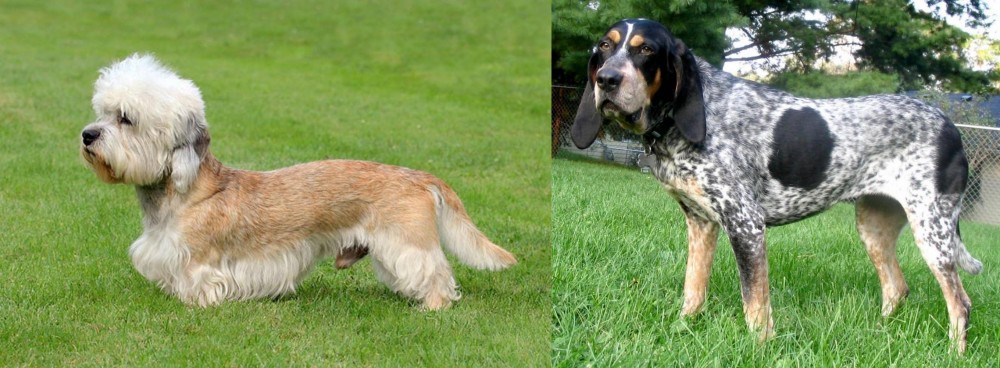 Dandie Dinmont Terrier is originated from United Kingdom but Griffon Bleu de Gascogne is originated from France. Dandie Dinmont Terrier may grow 29 cm / 11 inches shorter than Griffon Bleu de Gascogne. Dandie Dinmont Terrier may weigh 16 kg / 35 pounds lesser than Griffon Bleu de Gascogne. Dandie Dinmont Terrier may live 3 years more than Griffon Bleu de Gascogne. Both Dandie Dinmont Terrier and Griffon Bleu de Gascogne has almost same litter size. Both Dandie Dinmont Terrier and Griffon Bleu de Gascogne requires Moderate Maintenance.
Dandie Dinmont Terrier is originated from United Kingdom but Griffon Bleu de Gascogne is originated from France. Dandie Dinmont Terrier may grow 29 cm / 11 inches shorter than Griffon Bleu de Gascogne. Dandie Dinmont Terrier may weigh 16 kg / 35 pounds lesser than Griffon Bleu de Gascogne. Dandie Dinmont Terrier may live 3 years more than Griffon Bleu de Gascogne. Both Dandie Dinmont Terrier and Griffon Bleu de Gascogne has almost same litter size. Both Dandie Dinmont Terrier and Griffon Bleu de Gascogne requires Moderate Maintenance.
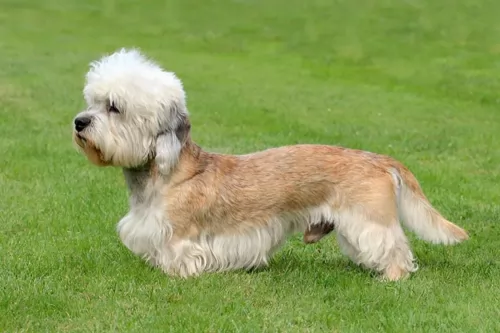 The rough coated Dandie Dinmont Terrier originates from Scotland. They were used centuries ago for hunting otters and badgers.
The rough coated Dandie Dinmont Terrier originates from Scotland. They were used centuries ago for hunting otters and badgers.
There are theories that exist that the dog is a cross between Scottish- and Skye Terriers while others believe there must be some Dachshund in the mix because of the long body of the Dandie Dinmont Terrier.
The Dandie Dinmont Terrier was first recorded as a distinct breed in the late 1600s. The British Dandie Dinmont Terrier Club was formed in 1875 while the American Kennel Club recognized the Dandie in 1886.
 The Griffon Bleu de Gascogne dog hails from France and is descended from crosses between the Bleu de Gascogne as well as the Griffon Nivernais. Dog experts tell us that the Grand Griffon Vendeen is also part of the mix.
The Griffon Bleu de Gascogne dog hails from France and is descended from crosses between the Bleu de Gascogne as well as the Griffon Nivernais. Dog experts tell us that the Grand Griffon Vendeen is also part of the mix.
Raised as working dogs, with his good nose and alertness, he has always been used as a single hunting dog or being used as part of a pack.
It was in 1920 that the first Griffon Bleu de Gascogne breed standard was written in France, and over the decades, the dog hasn’t changed much in looks except that it is slightly taller.
This is a rare breed not much seen outside of France, but breeding attempts have taken it from ‘close to extinction’ to a popular pet today.The Griffon Bleu de Gascogne was recognized by the United Kennel Club in 1991.
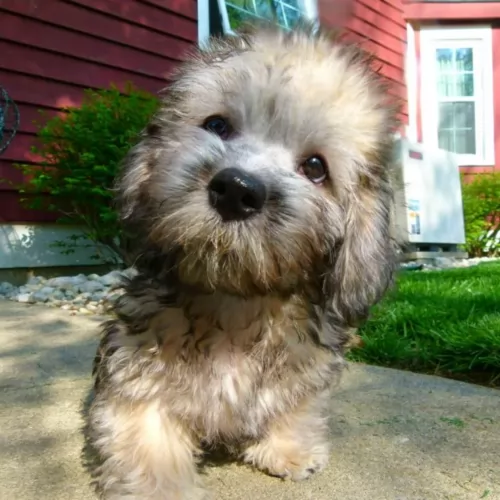 The Dandie Dinmont Terrier is a small dog who stands between 20 – 28cm at the withers and weighs between 8 and 11kg. He is recognizable by his fluffy head of hair.
The Dandie Dinmont Terrier is a small dog who stands between 20 – 28cm at the withers and weighs between 8 and 11kg. He is recognizable by his fluffy head of hair.
He actually has quite a unique look with his long body and slightly over-sized head. He has floppy ears and a long tail. His coat is quite unusual too in that it can be silky and long around the face, legs and belly, while the topcoat is fairly shortish and crisp. His coat color is fawn to brown or reddish. He isn’t a heavy shedder.
Known also as the Dandie, Charlie’s Hope Terrier, the Mustard and Pepper Terrier, the Dandie Dinmont makes an excellent family pet with his calm demeanor, being somewhat reserved around strangers.
He is an alert, intelligent little dog and will warn you of strangers coming into your space. He therefore makes a good watchdog. He is loving and loyal to his human family and will readily fit into life in the city or in the countryside.
They are good with children and pets but with his independent streak, he will require training and socialization if you want him to behave and be obedient.
 This is a medium to large sized scenthound. He stands at anything between 48 to 57cms and weighs between 16 and 27kg.
This is a medium to large sized scenthound. He stands at anything between 48 to 57cms and weighs between 16 and 27kg.
He has a long, wiry type of coat which is usually a mottled white and black, taking on a blue hue look. There are tan marking above the eyes and around the muzzle. The ears of the dog are long and floppy, he has that typical soulful look in his brown eyes and the tail is long with a curve at the point.
The Griffon Bleu de Gascogne is an intelligent dog breed, capable of learning quickly and therefore will do well with training and socialization.
This popular docile dog gets on well with other pets in the home as well as with children. He is alert and energetic but is known to be a loyal and loving dog, being good with children, particularly those he grew up with.
The dog isn't particularly well suited to city life simply because of his high energy. He will require a good deal of exercise, so essentially he needs a home with a fair sized garden. He will want to join you on your walks. Walks provide your pet with stimulation and are good for socializing a dog too.
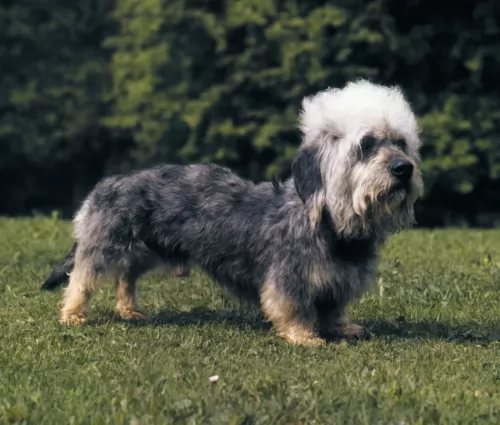 Your Dandie Dinmont is capable of being a wonderful companion. He loves spending time with his human family and is affectionate and loyal.
Your Dandie Dinmont is capable of being a wonderful companion. He loves spending time with his human family and is affectionate and loyal.
The small Dandie is able to fit into life in the city or country, just so long as he has his human family with him. Because he comes from Terrier dogs, he is no push-over though and he has an independent streak which will benefit from training and socialization.
Make sure you give this small dog of yours plenty of love and good care and you will find that you have a loyal, devoted friend in him.
 Your Griffon Bleu de Gascogne is such a popular pet in France and Spain simply because he is so amicable, getting on well with everyone in the home.
Your Griffon Bleu de Gascogne is such a popular pet in France and Spain simply because he is so amicable, getting on well with everyone in the home.
He is everything that a pet lover wants – loving, protective, friendly and companionable. They get on well with other pets too and they’re easy to train, becoming super obedient. Add to that the fact that he isn’t a sickly dog and is also fairly low maintenance.
This dog has all it takes to make him the most splendid pet.
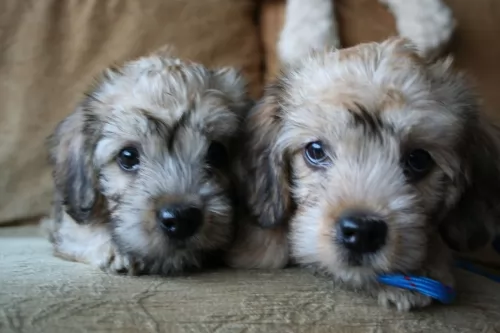 Your pet Dandie Dinmont is a robust little dog who, with good care, can live to be anything between 12 to 15 years of age.
Your pet Dandie Dinmont is a robust little dog who, with good care, can live to be anything between 12 to 15 years of age.
With every dog breed there will be health concerns, and these can include illnesses such as epilepsy as well as hypochondroplasia. All dogs have the potential to fall prey to health problems, and getting your pet from a reputable breeder can help to ensure you eliminate some of these diseases.
This small dog has a long body which means he can be affected by spinal problems. Genetics and body shape play a large role. Intervertebral disc disease is a condition where the cushioning discs between the vertebrae of the spinal column herniate into the spinal cord space. The discs press on the nerves and pain and paralysis can follow.
 As a healthy dog breed, your Griffon Bleu de Gascogne isn't likely to cost you much at the vet. Nonetheless there are some common dog ailments that you need to be aware of.
As a healthy dog breed, your Griffon Bleu de Gascogne isn't likely to cost you much at the vet. Nonetheless there are some common dog ailments that you need to be aware of.
Some dog owners, when buying a Griffon puppy, want to see health clearance certificates to show that the parents of the puppy are free from the like of certain diseases such as hip dysplasia and von Willebrand's disease.
This is a condition where your dogs thighbone doesn't fit properly into the hip joint. Your puppy can develop this condition from 4 months of age already.
With some dogs you can see the pain, and they may even become lame in one or both back legs. Hip dysplasia is hereditary, but environmental factors such as an injury or the wrong diet can contribute towards your pet succumbing to hip dysplasia.
A skin allergy can make your pet totally miserable as they lick and scratch with discomfort, pain and irritation. All the scratching and licking can cause secondary infections and your pet can even lose his hair.
Atopic Dermatitis is when your dog is allergic to things like dust or pollen. Some people look at homeopathic treatments for dogs and are pleased with the results. The thing is you need to get help for your pet as it can cause your pet endless misery.
 The Dandie doesn’t require as much exercise as some other dog breeds but you want to make sure he goes with you on your walks, or you play ball with him in the garden. You don’t want to see a small dog like this becoming obese as it can herald in a host of health problems.
The Dandie doesn’t require as much exercise as some other dog breeds but you want to make sure he goes with you on your walks, or you play ball with him in the garden. You don’t want to see a small dog like this becoming obese as it can herald in a host of health problems.
The Dandie Dinmont Terrier doesn’t shed a hang of a lot but still, you will need to brush him twice a week to get rid of those loose hairs. Also, the coat will require stripping twice a year. Some dog owners who prefer a low maintenance breed might not like knowing this, but it is a necessary part of his grooming. There are some dog owners who cut the hair rather, but then the texture of the coat will change. This is only important to know if you want to show your Dandie. Other Dandie owners take their pets to a professional groomer for clipping.
Because the Dandie has floppy ears and a lot of hair around the face and ears, you will need to check his ears for dirt and wax build-up as these can cause an ear infection. If you’re nervous to be going inside your dog’s ears, the vet or the dog groomer can show you how.
Also, little dogs like this are prone to tooth decay, and you will need to brush his teeth 2 or 3 times a week. This is because plaque and tartar buildup can cause mouth infections which contribute to other diseases within the body.
 The Griffon Bleu de Gascogne is a rough, shaggy, fairly long coated dog and is an average shedder. He will therefore require regular brushing to get rid of grass and burrs that cling to the hair, causing it to matt and tangle.It's always a good chance for you to check him over for ticks and fleas too.
The Griffon Bleu de Gascogne is a rough, shaggy, fairly long coated dog and is an average shedder. He will therefore require regular brushing to get rid of grass and burrs that cling to the hair, causing it to matt and tangle.It's always a good chance for you to check him over for ticks and fleas too.
He has floppy ears, so these will require cleaning to prevent infections. Check his nails too and trim them as needed. Take him to the vet for this if you're not sure how or you don't have the correct grooming tools.
Just like his human family, a dog needs to have his own sleeping spot – a place which is warm and dry and which he can retreat too. It is a good idea to train your dog to sleep in his own place where there are some warm blankets which are clean and comfortable for him.
You chose to bring a dog into your home, and it is therefore your responsibility to see that he is looked after well.
To keep him healthy, he will require high-quality kibble twice a day. How much your Griffon eats will depend on his age and his activity levels. Follow the feeding directions carefully on the packaging to ensure you keep him in good shape.
Remove the boredom of the same food every day by adding in some raw meat as well as cooked chicken, rice and vegetables as a tasty treat. This will keep him alert, healthy and his coat shiny. Fresh, cool water should be constantly available.